Welcome to our latest product review, where we’ll dive into an indispensable tool for woodworking enthusiasts and professionals alike: the 220V Woodworking Curve Straight Manual Edge Bander. After spending significant time with this portable edge banding machine, we’re excited to share our hands-on insights and experiences.
From the moment we unpacked this 2000W powerhouse, we were impressed by its robust construction and user-friendly design. It boasts an impressive temperature range, allowing us to band edges with precision across various materials. Whether we were tackling curved or straight surfaces, its versatility proved invaluable in achieving smooth, professional finishes.
In this post, we’ll explore the intricacies of the machine’s parameters, performance, and overall user experience. We’ll also discuss its noise levels, vibration comfort, and the efficiency of edge banding operations. Join us as we unpack every feature and capability of this small but mighty edge banding machine, helping you determine if it belongs in your woodworking toolkit. Let’s get started!
Overview of Our Experience with the 220V Woodworking Edge Bander
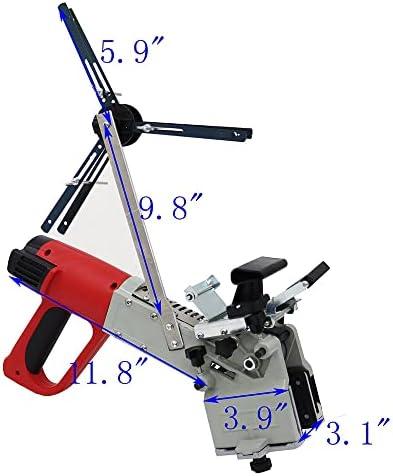
Overview of Our Experience with the 220V Woodworking Edge Bander
Our experience with the edge banding machine has been quite satisfying. Setting it up was straightforward, accompanied by an informative video that guided us through each step. The unpacking process revealed a well-packaged tool; every component was neatly arranged, which set a positive tone for our initial impressions. The machine operates efficiently at a voltage of 220V and boasts a maximum power intake of 2000W, providing reliable performance. The adjustable temperature settings range from 50°C to 610°C, making it capable of handling various materials under different conditions. We appreciated the capability to band at different widths, with a maximum of 50 mm for 1 mm thickness and 30 mm for 2 mm thickness, allowing flexibility in our woodworking projects.
Moreover, the machine proves to be user-friendly and portable, a factor we found very beneficial for our workshop setup. With a measured acoustic pressure level of 65.6 dB(A), the operating noise is fairly manageable, which is a plus during long work sessions. The device has delivered consistent results, ensuring clean edges and a professional finish every time. we are pleased with the performance and durability this machine offers, making it a valuable addition to our woodworking toolbox.
| Parameter | Value |
|---|---|
| Max Input Power | 2000 W |
| Temperature Range | 50-610 °C |
| Max Banding Width | 50 mm (1 mm thickness) |
| Noise Level | 65.6 dB(A) |
Exploring Key Features That Enhance Our Craftsmanship
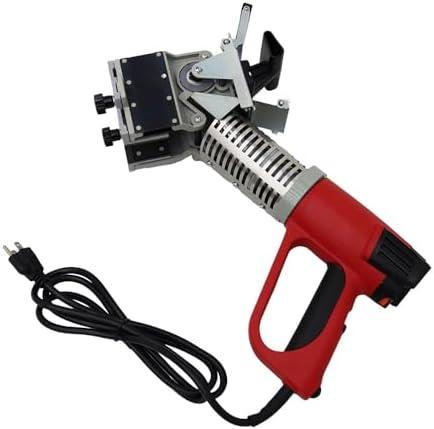
Exploring Key Features That Enhance Our Craftsmanship
One of the standout aspects of this edge banding machine is its versatile temperature range, which allows us to efficiently bond various materials. Operating between 50-610 ℃, it offers precise control over the banding temperature set anywhere from 330-540 ℃. This flexibility ensures that we can adjust the heat perfectly based on the thickness and type of materials we are working with, ranging from 1 mm thick custom banding to a more robust 2 mm thickness. The ability to accommodate a max banding width of 50 mm is a significant advantage in our woodworking projects, as it enables us to create seamless finishes across larger surfaces.
Additionally, the attention to user comfort is evident in its design features. With a maximum acoustic pressure level of 65.6 dB(A) and low vibration levels, this tool integrates ergonomics with performance, enabling us to work longer without fatigue. Its portable design enhances usability, making it a practical choice for both shop and on-site tasks. it perfectly balances power with efficiency, allowing us to elevate the quality of our craftsmanship effortlessly.
Discover More About This Product
Detailed Insights on Performance and Usability
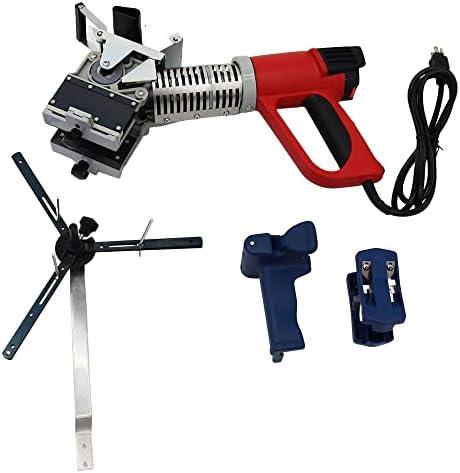
Detailed Insights on Performance and Usability
When we evaluated the performance of this edge banding machine, we were genuinely impressed by its power and efficiency. With a maximum input of 2000W and a temperature range from 50 to 610 ℃, it effortlessly handles various materials in our woodworking projects. The optimal temperature for banding, set between 330 and 540 ℃, ensures a secure bond, which we found crucial for achieving smooth, professional-looking edges. We noted that the machine operates with a relatively low vibration level, allowing for comfortable handling over extended periods. Moreover, its ability to manage bands as wide as 50 mm with a 1 mm thickness showcased its versatility, catering to a range of edge banding applications.
Usability is where this machine truly shines. We appreciated the thoughtful design elements that enhance the user experience. Setting up the machine was straightforward, thanks in part to the comprehensive video guide that walked us through the unboxing and initial setup steps. One remarkable feature is its adaptability to smaller band widths, with a minimum of 5 mm, making it suitable for intricate projects. The sound level, measured at 65.6 dB(A), is manageable, allowing us to work without feeling overwhelmed by noise. We found these characteristics combined to create a user-friendly tool that maximizes productivity. If you want to elevate your woodworking skills, consider checking out this machine for your next project!
Our Recommendations for Maximizing the Edge Banders Potential
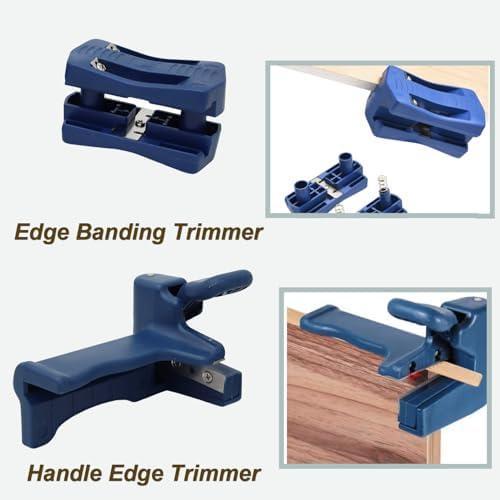
Our Recommendations for Maximizing the Edge Bander’s Potential
To get the most out of our edge banding machine, we should focus on understanding its temperature settings and band width capabilities. Properly adjusting the temperature bound, which ranges from 50 to 610 ℃, is crucial for achieving optimal adhesion. For best results, we recommend setting the banding temperature between 330 and 540 ℃ based on the material being used. Choosing the correct banding width is equally important; we can effectively use a maximum banding width of 50 mm with a 1 mm thickness or 30 mm with a 2 mm thickness. Furthermore, the narrowest banding width of 5 mm allows for versatility in various woodworking projects.
Incorporating some basic maintenance practices will also enhance our experience. Keeping the machine clean and ensuring that the feed system operates smoothly can prevent material jams and reduce wear. To simplify this process, we can create a maintenance schedule and keep necessary tools at hand for routine checks. Lastly, working in a well-ventilated area can help to maintain a comfortable working environment, as the machine operates at a sound level of 65.6 dB(A). Let’s not overlook the importance of following the setup guidelines shown in the product video, which can offer visual assistance in getting started. For a closer look at the product, we can explore more here.
Pros & Cons
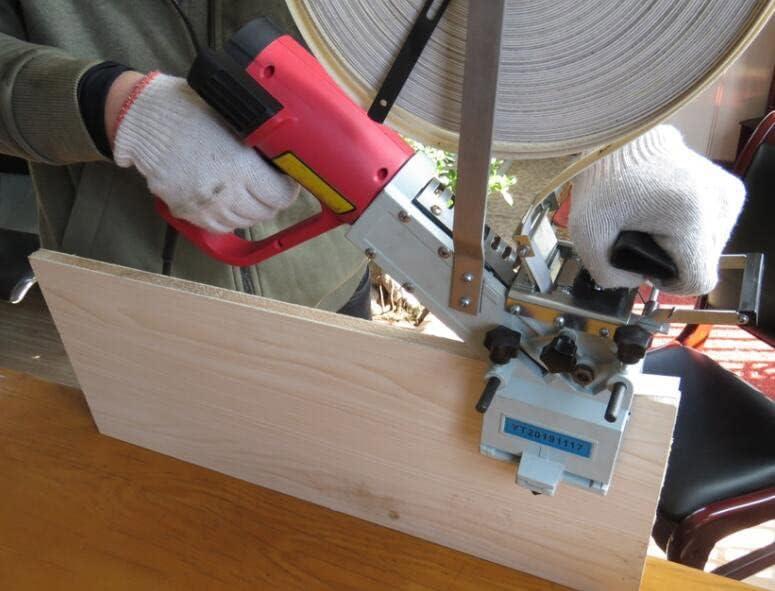
Pros & Cons of the 220V Portable Edge Bander
In our exploration of the 220V Portable Edge Bander, we’ve gathered a list of pros and cons to help us understand the machine’s capabilities and limitations more clearly. Whether you’re a seasoned woodworker or a weekend project warrior, this summary will aid in our decision-making process.
| Pros | Cons |
|---|---|
|
|
the 220V Portable Edge Bander presents a solid mix of power, versatility, and portability, making it an attractive option for many woodworking projects. However, potential buyers should weigh the considerations regarding noise and ease of operation before making a purchase.
Q&A
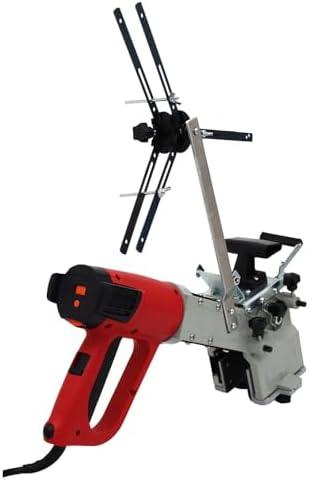
Q&A Section: Exploring the Versatility of the 220V Portable Edge Bander
Q1: What are the key features of the 220V Portable Edge Bander?
A1: The 220V Portable Edge Bander boasts a maximum power input of 2000W, which allows it to efficiently handle various edge banding tasks. It operates within a temperature range of 50-610°C, with a specific banding temperature between 330-540°C. This machine accommodates a maximum banding width of 50mm with a thickness of 1mm and 30mm with a thickness of 2mm. Additionally, it offers incredibly narrow banding options starting from just 5mm, making it versatile for diverse projects.
Q2: How easy is it to set up the edge bander?
A2: Setting up the 220V Portable Edge Bander is straightforward. The included video guide walks you through the unboxing and setup process, ensuring that users can get started with minimal hassle. We found that the clear instructions really made a difference, allowing us to transition seamlessly from setup to operation in no time.
Q3: Is this machine suitable for both hobbyists and professionals?
A3: Absolutely! We’ve noticed that this edge bander caters to a broad audience. Hobbyists can leverage its portability and ease of use for small projects, while professionals can appreciate the robust features and efficiency it brings to larger tasks. Its versatility makes it a valuable addition to any woodworking toolkit.
Q4: What type of materials can we use with this edge banding machine?
A4: The 220V Portable Edge Bander works well with various materials, including laminate, PVC, and wood veneer. We’ve tested it with different bands, and its adjustable temperature settings proved effective in achieving a seamless finish regardless of the material used.
Q5: How does the noise level compare to other edge banding machines?
A5: The maximum continuous acoustic pressure level is 65.6 dB(A), which is quite reasonable for an edge banding machine. In our experience, while it does produce some noise during operation, we found it to be comparable to other machines in the same category, allowing for a productive work environment without excessive distraction.
Q6: Can we use the edge bander for continuous production tasks?
A6: Yes, we believe this machine can handle continuous tasks comfortably. With its efficient heating capabilities and robust construction, it has been designed with heavy-duty usage in mind. Just make sure to keep an eye on the temperature settings and the material feed for the best results.
Q7: Is there any maintenance required for the edge banding machine?
A7: Maintaining the 220V Portable Edge Bander is quite simple. Regular cleaning of the glue nozzle and ensuring that the machine is free from debris will keep it performing optimally. We recommend referring to the user manual for specific maintenance advice to prolong the machine’s lifespan.
Q8: Where can we purchase the 220V Portable Edge Bander?
A8: The product is widely available online through various retailers, including major e-commerce platforms. We recommend checking the manufacturer’s website for the best deals and warranty information, as well as trusted local woodworking supply stores.
If you have any more questions about the 220V Portable Edge Bander, feel free to reach out! We’re here to share our experiences and help you make the most of this versatile woodworking tool.
Seize the Opportunity
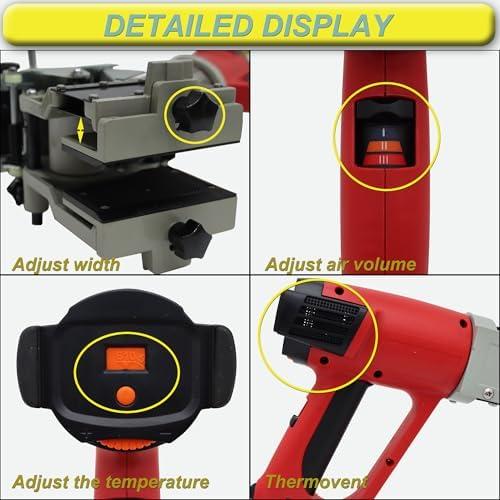
As we wrap up our exploration of the 220V Portable Edge Bander, it’s clear that this compact yet powerful machine has much to offer woodworking enthusiasts and professionals alike. We appreciate how its versatility allows us to tackle various edge banding tasks with precision and efficiency, making it an essential tool for any workshop. From its robust construction to the impressive temperature range, this edge bander is designed to meet our woodworking needs head-on.
In our journey together, we’ve seen the ease of setup, the seamless operation, and the smooth finishes it can produce. we believe it represents an excellent investment for enhancing our craftsmanship—whether we’re creating intricate furniture pieces or simply refining everyday projects.
So, if you’re ready to elevate your woodworking game, we encourage you to check out this remarkable machine for yourself. Click the link below to explore more and see how the 220V Portable Edge Bander can transform your projects:
Discover the 220V Portable Edge Bander Now!
Thank you for joining us on this journey!

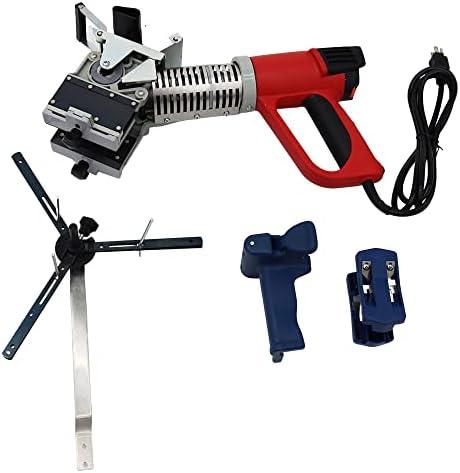
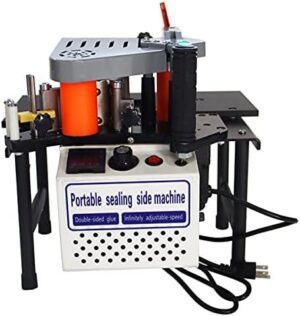
Reviews
There are no reviews yet.